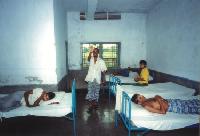Most
people believe that mental disorders are rare and “happen to someone
else." In fact, mental disorders are extremely common and widespread.
All societies have struggled with the impact of mental illness, and
rejection and avoidance of mentally disabled people are common. Public
attitudes to mental health problems surface in many different ways.
They are apparent in the language people use to describe mental illness
and in their reactions to those experiencing mental distress. For
many, mental illness is a taboo subject. This can prevent people from
seeking help when faced with a mental health problem. Negative attitudes
are evident in the care, secrecy and discretion people would exercise
to visit a psychiatrist.

One
of the commonest reflections of this diffidence and ignorance is the
use of the term 'Nervous Breakdown.' It is a popular term, though
not a clinical one that is often used to describe a mental disorder
that a person experiences. It is used for a number of reasons, such
as to hide a diagnosis, to avoid the stigma of a diagnosis, not understanding
the reasons for certain loss of function (such as not seeing a doctor,
but having symptoms) and not accepting a diagnosis among others.
So what are mental health and mental illness all about?
Mental health is not just the absence of mental disorder.
Rather, it is a state of well-being in which the individual realises
his or her own abilities, can cope with the normal stresses of life,
can work productively and fruitfully, and is able to make a contribution
to his or her community.
Mental illnesses affect the functioning and thinking processes of
the individual, greatly diminishing his or her social role and productivity
in the community. In addition, because mental illnesses are disabling
and last for many years, they take a tremendous toll on the emotional
and socio-economic capabilities of relatives who care for the patient,
especially when the health system is unable to offer treatment and
support at an early stage.
Mental health problems have the potential to affect anyone regardless
of that person's age, sex, socio economic status, educational background
and so on. The prevalence and incidence of such problems remains virtually
the same in all countries all over the world. However, in countries
like India and Bangladesh, the infrastructure available to treat these
tens of millions of patients is woefully inadequate. This becomes
worse because of the stigma and a large number of misconceptions associated
with mental health related issues.
Several recent surveys indicate that stigma and prejudice against
people with mental health problems are reduced when the general public
is better informed.
There are more than 200 classified forms of mental illness. Before
we take a quick overview of some such glaring problems, we need to
understand what the warning signals for mental illness are. It is
important to understand that these disorders can now be diagnosed
reliably and as accurately as the most common physical disorders.
Some can be prevented and all can be successfully managed and treated
provided treatment is sought in good time from qualified personnel.

Causes
of Mental Illness
Mental health problems may be related to excessive stress due to a
particular situation or series of events. As with cancer, diabetes
and heart disease, mental illnesses are often physical as well as
emotional and psychological. Mental illnesses may be caused by a reaction
to environmental stresses, genetic factors, biochemical imbalances,
or a combination of these. With proper care and treatment many individuals
learn to cope or recover from a mental illness or emotional disorder.
Warning
Signs and Symptoms
The following are signs that might warrant a visit to a mental health
professional.
In adults:
Confused thinking
Prolonged depression, sadness or irritability
Feelings of extreme highs and lows
Excessive fears, worries and anxieties
Social withdrawal
Dramatic changes in eating or sleeping habits
Strong feelings of anger
Delusions or hallucinations
Growing inability to cope with daily problems and activities
Suicidal thoughts
Denial of obvious problems
Numerous unexplained physical ailments
Substance abuse
In older children and
pre-adolescents:
Substance abuse
Inability to cope with problems and daily activities
Change in sleeping and/or eating habits
Excessive complaints of physical ailments
Defiance of authority, truancy, theft, and/or vandalism
Intense fear of weight gain
Prolonged negative mood, often accompanied by poor appetite or thoughts
of death
Frequent outbursts of anger
In younger children:
Changes in school performance
Poor grades despite adequate and consistent effort
Excessive worry or anxiety (i.e. refusing to go to bed or school)
Hyperactivity
Persistent nightmares
Persistent disobedience or aggression
Frequent temper tantrums
Drug / Alcohol Addiction
For the last few years, Bangladesh is in the grip of the most severe
and vicious problem imaginable, which is the problem of drug dependence
or addiction. People from all walks of life, of both sexes, both young
and old, have been affected. The lack of proper, scientific treatment
has made it very difficult for the individual to get out of the clutches
of drugs.
There are a number of disorders resulting from the use of psychoactive
substances including opioids such as heroin, codeine (present in Phensidyl)
and pethidine, alcohol, cannabinoids such as marijuana, sedatives
and hypnotics, stimulants such as YABA, amphetamines and cocaine,
hallucinogens and tobacco. The conditions include acute intoxication,
harmful use, dependence and psychotic disorders. Tobacco, heroin and
alcohol are the substances which are abused most widely across the
globe and which pose the most serious public health consequences.
( to be continued…)
The writer is Chief Consultant, Neuropsychiatrist, Prottoy Medical
Clinic Ltd. Dhaka.


